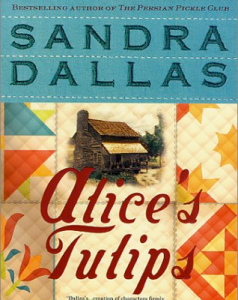Sandra Dallas, author of Alice’s Tulips, is becoming one of my favorite authors for a variety of reasons. First, her books well-researched on two levels, relating both the familiar history of the times and the lesser known history of women’s life within those times. Second, quilting is an integral part to her books, whatever their time period in American history. Sometimes it pays a minor role, sometimes a major one. But quilting always puts in an appearance. Third, many of her books are set, at least partially, in Iowa. Or they’re set in Colorado, but make references to Iowa. For all those reasons, I find Dallas’s books satisfying.
So when our book club picked Alice’s Tulips for November, I read it eagerly and came away satisfied as always. Set in southeastern Iowa in the Civil War, it tells the story of Alice, the young bride of a Union soldier. She runs the family farm, under the sharp eye of her grim and prim mother-in-law. The story is told through the letters Alice writes to her older sister, Lizzie. Through the letters, readers see Alice face wartime challenges and suffering. As events unfold, she changes from a headstrong, selfish and judgmental girl into a wise, compassionate woman.
At her website, Dallas explains the origins of the book:
Poking through a consignment shop in Denver in the mid-1990s, I found a wonderful Civil War-era Friendship Quilt with names so wonderful that I wanted to use them for characters in a novel. Shortly afterward, I came across the mention of a quilt pattern for Alice’s Tulips, which I thought would make a fine title. I knew I wanted to write a book that included quilt lore, and Diane Mott Davidson, the best-selling culinary mystery writer, suggested I write a book of letters. With all those elements, I went in search of a plot and came up with Alice’s Tulips. At first, I wasn’t sure I had the background to write a book set during the Civil War. Then I realized that Alice’s Tulips is not about battles and troop movements but about women left behind during wartime and the bonds they forge with each other.
Alice’s Tulips (St. Martin’s Press, 2000) is not too long and not too short. Not too dark, but not too fluffy. Not overflowing with historical trivia but containing enough so you’ll learn something about Civil War women.
If you’re looking for a good read as winter closes in, Alice’s Tulips could be just what you want. A good book to make the long nights pass quickly and to make you thankful to be a woman in the 2010 instead of the 1860s.


